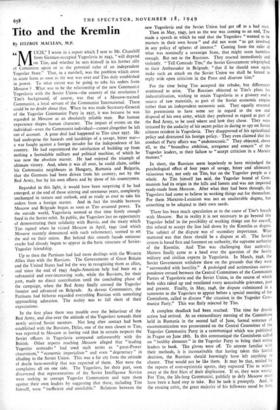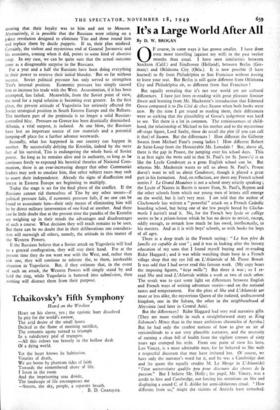Tito and the Kremlin
By FITZROY MACLLAN, M.P.
66 UCII," I wrote in a report which I sent to Mr. Churchill from German-occupied Yugoslavia in 1943, "will depend on Tito, and whether he sees himself in his former rob: of Comintern agent or as the potential ruler of an independent Yugoslav State." That, in a nutshell, was the problem which arose in acutc form as soon as the war was over and Tito duly established in power. To what extent was he goink to take his orders from Moscow ? . What was to be the relationship of the new Communist Yugoslavia with the Soviet Union—the country of the revolution ? Tito's background, of course, was that of a Moscow-trained Communist, a loyal servant of the Communist International. There could be no doubt about that. When he was made Secretary-General of the Yugoslav Communist Party in 1937, it was because he was regarded in Moscow as an absolutely reliable man. But human experience shapes human character. The impact of events on the individual—even the Communist individual—cannot altogether be left out of account. A great deal had happened to Tito since 1937. He had undergone the hazards and hardships of a savage, bitter war— a war fought against a foreign invader for the independence of his country. He had experienced the satisfaction of building up from nothing a formidable military and political machine, of which he was now the absolute master. He had enjoyed the triumph of ultimate victory. And, when it was all over, he could claim, unlike his Communist neighbours in Hungary, Rumania and Bulgaria, that the Germans had been driven from his country, not by the Red Army, but by his own efforts and by those of his countrymen.
Regarded in this light, it would have been surprising if he had emerged, at the end of those stirring and strenuous years, completely unchanged in stature and outlook, and as ready as ever to take his orders from a foreign master. And in fact the trouble between Moscow and Belgrade began as soon as Tito assumed power. To the outside world, Yugoslavia seemed at that time firmly enough fixed in the Soviet orbit. In public, the Yugoslays lost no opportunity of demonstrating their solidarity with Russia, and the treaty which Tito signed when he visited Moscow in April, 1945 (and which Moscow recently denounced with such vehemence), seemed to set the seal on their union. But behind this smooth façade ominous cracks had already begun to appear in the basic structure of Soviet- Yugoslav friendship.
Up to then the Partisans had had more dealings with the Western Allies than with the Russians. The Governments of Great Britain and the United States had led the way in recognising them as allies, and since the end of 1943 Anglo-American help had been on a substantial and ever-increasing scale, while the Russians, for their part, made no direct contribution until the concluding phase of the campaign, when the Red Army finally crossed the Yugoslav frontier and advanced on Belgrade. As devout Communists, the Partisans had hitherto regarded everything Russian with something' approaching adoration. The reality was to fall short of their expectations.
In the first place there was trouble over the behaviour of the Red Army, and also over the attitude of the Yugoslays towards their newly arrived Soviet mentors. Not long after contact had been established with the Russians, Djilas, one of the men closest to Tito, was reported to Moscow as having said that in certain respects the Soviet officers in Yugoslavia compared unfavourably with the British. Other reports reaching Moscow alleged that " leading Yugoslav comrades" had used such terms as " great-Power chauvinism," "economic imperialism" and even " degeneracy " in alluding to the Soviet Union. This was a far cry from the attitude of docile hero-worship that was expected of them. Nor were the complaints all on one side. The Yugoslays, for their part, soon discovered that representatives of the Soviet Intelligence Service were seeking to corrupt Yugoslav Communists and turn them against their own leaders by suggesting that these, including Tito himself, were " inefficient and unreliable." Relations between the new Yugoslavia and the Soviet Union had got off to a bad start.
Then in May, 1945, just as the war was coming to an end, Tito made a speech in which he said that the Yugoslays " wanted to be masters in their own house " and did not want " to get involved in any policy of spheres of interest." Coming from the ruler of what was nominally a sovereign State, that might seem harmless enough. But not to the Russians. They reacted immediately and violently. " Tell Comrade Tito," the Soviet Government telegraphed to their Ambassador in Belgrade, " that if he should once again make such an attack on the Soviet Union we shall be forced to reply with open criticism in the Press and disavow him."
For the time being Tito accepted the rebuke, but differences continued to arise. The Russians objected to Tito's plans fur industrialisation, wishing to retain Yugoslavia as a granary and a source of raw materials, as part of the Soviet economic empire rather than an independent economic unit. They equally resented his pretensions to have some say in regard to the use and disposal of his own army, which they preferred to regard as part of the Red Army, to be used where and how they chose. They were irritated by the audacity of his secret police in daring to spy on Soviet citizens resident in Yugoslavia. They disapproved of his agricultural policy and distrusted his foreign policy.- They even claimed that his conduct of Party affairs was " undemocratic." They objected, above all, to the " boundless ambition, arrogance and conceit" of the Yugoslav leaders, to their failure to "accept criticism in a Marxist manner."
In short, the Russians seem hopelessly to have misjudged the psychological effect of four years of savage, bitter and ultimately victorious war, not only on Tito, but on the Yugoslav people as a whole. As Tito himself has said, the Yugoslav brand of Com- munism had its origin in the hills and forests and was not imported ready-made from Moscow. After what they had been through, the Yugoslays had come to believe in working things out for themselves. For them Marxism-Leninism was not an unalterable dogma, but something to be adapted to their own needs.
There has been much speculation as to the cause of Tito's breach with Moscow. But in reality it is not necessary to go beyond this Yugoslav belief in the possibility of working things out for oneself, this refusal to accept the line laid down by the Kremlin as dogma. The subject of the dispute was of secondary importance. What mattered was that there should be a dispute at all. The Soviet system is based first and foremost on authority, the supreme authority of the Kremlin. And Tito was challenging that authority. Matters finally came to a head over the question of the Sovirt military and civilian experts in Yugoslavia. In March, 1948, the Soviet Government withdrew these on the grounds that they were " surrounded with hostility." A prolonged and acrimonious corres- pondence ensued between the Central Committees of the Communist Parties of Yugoslavia and the Soviet Union, in the course of which both sides raked up and ventilated every conceivable grievance, past and present. Finally, in May, 1948, the dispute culminated in a summons to the Yugoslays to appear before a special meeting of the Cominform, called to discuss " the situation in the Yugoslav Com- munist Party." This was flatly rejected by Tito.
A complete deadlock had been reached. The time for drastic action had arrived. At an extraordinary meeting of the Cominform held in Rumania in the second half of June, formal sentence of excommunication was pronounced on the Central Committee of the Yugoslav Communist Party in a communiqué which was published in Prague on June 28th. In this communiqué the Cominform called on " healthy elements" in the Yugoslav Party to bring their erring leaders to book. The gloves were off. To anyone familiar with their methods, it is inconceivable that having taken this fateful decision, the Russians should knowingly have left anything to chance. That would not be like them. It may be that, misled by the reports of over-optimistic agents, they expected Tito to wither away at the first blast of their displeasure. If so, they were wrong. For Tito, the life-long Communist, publicly to defy Moscow must have been a hard step to take. But he took it promptly. And, in the ensuing crisis, the great majority of his-followers stood by
showing that their loyalty was to him and not to Moscow. Alternatively, it is possible that the Russians were relying on a palace revolution designed to eliminate Tito and those round him and replace them by docile puppets. If so, their plan misfired. Certainly, the violent and mysterious end of General Jovanovic and his associates, coming when it did, points to some kind of abortive coup. In any case, we can be quite sure that the actual outcome came as a disagreeable surprise to the Russians.
For a year and a half the Russians have been doing everything in their power to retrieve their initial blunder. ' But so far without success. Soviet political pressure has only served to strengthen Tito's internal position. Economic pressure has simply caused him to increase his trade with the West. Assassination, if it has been attempted, has failed. Meanwhile, from the Soviet point of view, the need for a rapid solution is becoming ever greater. In the first place, the present attitude of Yugoslavia has seriously affected the Soviet strategical position in South Eastern Europe and the Balkans. The northern part of the peninsula is no longer a solid Russian- controlled bloc. Pressure on Greece has been drastically diminished. Albania, a vital outpost, is isolated. At one blow, the Russians have lost an important source of raw materials and a potential jumping-off place for a further advance westwards.
Secondly, what has happened in one country can happen in another. By successfully defying the Kremlin, indeed by the mere fact of his survival, Tito is endangering the whole basis of Soviet power. So long as he remains alive and in authority, so long as he continues freely to expound his heretical theories of National Com- munism, there is an ever-increasing danger that other Communi.st leaders may seek to emulate him, that other subject races may seek to assert their independence. Already the signs of disaffection and unrest in Eastern Europe are beginning to multiply.
Today the stage is set for the final phase of the conflict. If the Russians cannot rid themselves of Tito by any other means—if political pressure fails, if economic pressure fails, if no one can be found to assassinate him—their only means of eliminating him will be by direct military intervention of one kind or another. And there can be little doubt that at the present time the pundits of the Kremlin are weighing up in their minds the advantages and disadvantages of such a course. What decision they will reach remains to be seen. But there can be no doubt that in their deliberations one considera- tion will outweigh all others, namely, the attitude in this matter of the Western Powers.
If the Russians believe that a Soviet attack on Yugoslavia will lead to a general conflagration, they will stay their hand. For at the present time they do not want war with the West, and, rather than risk one, they will continue to tolerate the, to them, intolerable situation in Yugoslavia. But, if they estimate that, in the event of such an attack, the Western Powers will simply stand by and hold the ring, while Yugoslavia is battered into submission, then nothing will distract them from their purpose.















































































 Previous page
Previous page